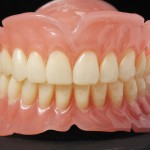
Studies suggest that the use of implant overdentures (IODs) improved patient satisfaction and overall quality of life.
The aim of this review was to assess the impact of IODs on masticatory performance, bite force, patient’s satisfaction and nutritional state of patients
Methods
Searches were conducted in Medline, Embase and the Cochrane Central Register of Controlled Trials (CENTRAL) databases for prospective studies involving patients who received an implant-retained mandibular and/or maxillary IOD with a follow up of at least one year. Studies with less than 10 patients were excluded. Initial studies selection was by a single reviewer with full text analysis and risk of bias assessment being performed independently by two reviewers. Only English language studies were considered.
Results
- 53 studies were included in a narrative summary.
- Most studies reported on mandibular overdentures, only 3 reporting on maxillary overdentures.
- 5 out of 7 studies reporting on chewing ability reported an improvement.
- All 4 studies reporting on bite forces found an improvement.
- Implant-supported dentures were accompanied by high patient’s satisfaction with regard to denture comfort, but this high satisfaction was not always accompanied by improvement in general quality of life (QoL) and/or health-related QoL.
- No changes were seen in dietary intake, BMI and blood markers.
Conclusions
The authors concluded
Treating complete denture wearers with implants to support their denture improves their chewing efficiency, increases maximum bite force, and it clearly improves satisfaction. The effect on QoL is uncertain. There is little research about maxillary overdentures, so the results of this systematic review are mainly related to mandibular IODs. Because the over- whelming amount of research done on mandibular overdentures with a follow-up of 1 year, future research should focus on long-term results and maxillary overdentures.
Commentary
This review has included a large number of prospective studies and although the authors have indicated that they have been assessed for bias and quality that information is not provided in the main paper. The authors were not able to combine the data, so narrative summaries on the various outcome measures were reported. Simple counts of the number of studies supporting positive outcomes were provided. It would appear the part of the challenge to providing qualitative summary arose because of the range of custom-made questionnaires developed to assess patient satisfaction. With increasing interest in patient-based outcomes developing consensus on common outcome reporting would assist systematic reviews and help develop a more robust evidence base.
Links
Boven GC, Raghoebar GM, Vissink A, Meijer HJ. Improving masticatory performance, bite force, nutritional state and patient’s satisfaction with implant overdentures: a systematic review of the literature. J Oral Rehabil. 2014 Oct 13. doi: 10.1111/joor.12241. [Epub ahead of print] PubMed PMID: 25307515.

Don’t miss: Implant overdentures improved satisfaction, chewing and bite force http://t.co/XWmBIiwyBF